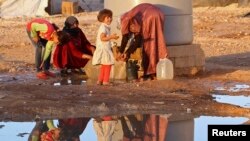CAPITOL HILL —
U.S. officials say the Syrian refugee crisis is deepening and overwhelming the ability of aid providers to respond to a humanitarian disaster of horrific proportions. On Tuesday, U.S. lawmakers heard a sobering assessment from America’s top refugee and humanitarian aid officials and responded with impatient calls for more to be done.
Syria’s civil war has displaced more than 2 million people - half of them children - and overwhelmed the ability of its neighbors to accept refugees. The State Department’s point person for refugees, Assistant Secretary Anne Richard, bluntly summarized the situation before a Senate panel on Capitol Hill.
“In a sense, it is the suicide of Syria. It is such an overwhelming crisis that, even though so many lives have been saved and so many people have gotten help in the places to which they have run, it is not enough,” said Richard.
Also testifying was humanitarian administrator Nancy Lindborg, of the U.S. Agency for International Development (USAID), who described an unprecedented mobilization by governments and aid groups to funnel assistance to Syria and its neighbors, including U.S. efforts totaling $1.3 billion.
“We know that humanitarian assistance is not the solution to this crisis, and it absolutely cannot end the bloodshed. But it is saving countless lives,” said Lindborg.
Democratic Senator Sheldon Whitehouse was among those who challenged the Obama administration to do more.
“We have been a day late and a dollar short consistently with our response to the Syrian crisis, and as a result I think there has been unnecessary human suffering,” said Whitehouse.
Fellow Democratic Senator Richard Durbin said the United States should take in more Syrian refugees and do so at a faster pace. When Republican Senator Ted Cruz asked if the refugee flow is destabilizing Syria’s neighbors, Anne Richard replied in the affirmative.
“It is having a devastating impact. It is undermining the stability of the region. It is no longer a Syria crisis, it is a regional crisis,” explained Richard.
Republican Senator Lindsey Graham said the humanitarian disaster would grow even more dire if countries like Jordan and Lebanon sealed their borders with Syria, and urged the officials present to draw up contingency plans for a worst-case scenario in the year to come.
“I am giving you an opportunity to tell us that maybe the worst is yet to come and prepare members of Congress who are sympathetic what kind of bill [funding request] you may send us. I would suggest to take this opportunity to sit down and write out what we may be facing as a nation in terms of our obligations to stabilize the region,” said Graham.
USAID’s Nancy Lindborg said worst-case scenarios have been envisioned - and repeatedly exceeded by the situation in and around Syria.
Syria’s civil war has displaced more than 2 million people - half of them children - and overwhelmed the ability of its neighbors to accept refugees. The State Department’s point person for refugees, Assistant Secretary Anne Richard, bluntly summarized the situation before a Senate panel on Capitol Hill.
“In a sense, it is the suicide of Syria. It is such an overwhelming crisis that, even though so many lives have been saved and so many people have gotten help in the places to which they have run, it is not enough,” said Richard.
Also testifying was humanitarian administrator Nancy Lindborg, of the U.S. Agency for International Development (USAID), who described an unprecedented mobilization by governments and aid groups to funnel assistance to Syria and its neighbors, including U.S. efforts totaling $1.3 billion.
“We know that humanitarian assistance is not the solution to this crisis, and it absolutely cannot end the bloodshed. But it is saving countless lives,” said Lindborg.
Democratic Senator Sheldon Whitehouse was among those who challenged the Obama administration to do more.
“We have been a day late and a dollar short consistently with our response to the Syrian crisis, and as a result I think there has been unnecessary human suffering,” said Whitehouse.
Fellow Democratic Senator Richard Durbin said the United States should take in more Syrian refugees and do so at a faster pace. When Republican Senator Ted Cruz asked if the refugee flow is destabilizing Syria’s neighbors, Anne Richard replied in the affirmative.
“It is having a devastating impact. It is undermining the stability of the region. It is no longer a Syria crisis, it is a regional crisis,” explained Richard.
Republican Senator Lindsey Graham said the humanitarian disaster would grow even more dire if countries like Jordan and Lebanon sealed their borders with Syria, and urged the officials present to draw up contingency plans for a worst-case scenario in the year to come.
“I am giving you an opportunity to tell us that maybe the worst is yet to come and prepare members of Congress who are sympathetic what kind of bill [funding request] you may send us. I would suggest to take this opportunity to sit down and write out what we may be facing as a nation in terms of our obligations to stabilize the region,” said Graham.
USAID’s Nancy Lindborg said worst-case scenarios have been envisioned - and repeatedly exceeded by the situation in and around Syria.




